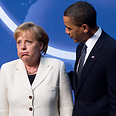
US spying just a symptom
Op-ed: Weak leadership, zigzagging caused European leaders to lose some of their respect for Obama
It is no coincidence that Putin gave Snowden temporary political asylum. The whistleblower has become a goldmine of embarrassing scandals that deepen the suspicion and mistrust in the US and Obama, mainly on the part of traditional allies. The White House denied the allegation that the NSA had tapped Merkel's personal mobile phone, but she was not convinced and demanded that Obama launch an investigation and transfer the findings to her. Obama also spoke with French President Francois Hollande about the claims that the NSA spied on 70.3 million phone calls in France between December 2012 and January 2013. It was reported that Obama's explanations and promises ended the crisis. But the spying by the US is a mere symptom of a far more complex problem.
Europe's leaders welcomed Obama's election as US president and his call for cooperation in leading the world, but such a format demands leadership skills and the ability to get things done. Europe's leaders detected Obama's weakness and feeble leadership time and time again, and the respect they had for him, on both a diplomatic and political level, significantly decreased. Leaders such as Merkel, British PM David Cameron, former French President Sarkozy and Polish President Bronislaw Komorowski were disappointed by the lack of a clear foreign policy and defense policy and by the peculiar "zigzagging" moves that didn't lead anywhere.
It appeared as though Obama was more enthusiastic about reconciling enemies than he was about preserving deep historic ties with his allies. On the other hand, Obama has to deal with severe economic, ideological and political crises at home, so perhaps he does not want to - or cannot – lead.
This was evident when NATO intervened militarily in Libya in March 2011. Pundits in Washington referred to Obama's policy as "leading from behind" – a strange policy that is unbecoming of a superpower. During the chemical weapons crisis in Syria Obama was deterred by the red line he himself had set and declared that the US was no longer willing to be the "world's policeman."
The gaps between Europe and the US are also obvious today also with regards to the resumed negotiations with Iran. While Obama is enthusiastic and optimistic about President Rohani's "charm offensive," the Europeans are much more cautious. They remember the Iranian tricks, lies and deceptions, some on the part of Rohani himself when he was in charge of the Iranian negotiation team during previous rounds of nuclear talks. They are aware that Iran's ultimate goal is to drive a wedge between Europe and the US and between the US and Israel in order to reach an optimal agreement. There is a reason why PM Netanyahu chose to meet with his Italian counterpart Enrico Letta in Rome to warn the West once again of an Iranian trap.
Putin, who wants Russia to reclaim its superpower status, detected Obama's weakness and the cracks in the West's positions. He filled the void left by Obama and became a dominant figure who influences and directs the most crucial diplomatic processes in the international arena. Edward Snowden is merely a pawn in the chess game Putin is playing.
Perhaps the talented employees of the NSA, which reportedly monitors phone conversations and email exchanges between terror groups, went too far and spied on European leaders. Maybe they believe these leaders are not doing enough to terminate terror cells, and perhaps that while monitoring the phone calls they find out what Europe's leaders really think of Obama and his policy.
In any case, Obama has a lot of work ahead of him. A though stance during the negotiations with Iran, such as the one he presented during the recent budget dispute with the Republicans in Congress, can serve as an appropriate response to the Snowden leaks and rehabilitate the US' international status and its relations with allies in Europe and other parts of the world.
Professor Eytan Gilboa is an expert on US affairs, heads the Center for International Communication and is a senior researcher at the Begin-Sadat Center for Strategic Studies at Bar-Ilan University.
- Receive Ynetnews updates directly to your desktop










